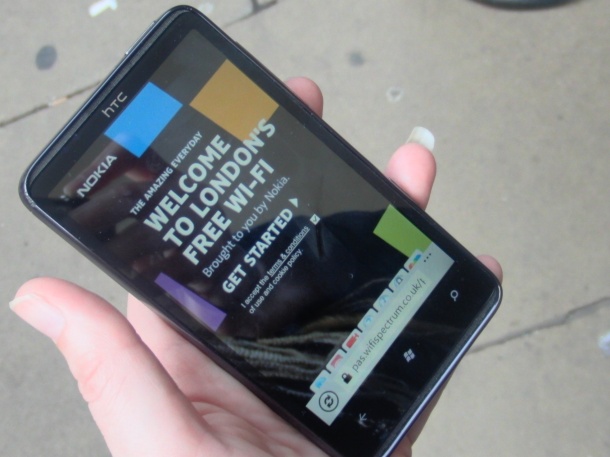Clunky log-ons keeping people off public Wi-Fi

Logging onto public Wi-Fi is still too complicated, leading to relatively low take-up by device owners, the Wireless Broadband Alliance has said in a report.

Nokia has launched a two-month trial of free on-street Wi-Fi in London for all mobile phones. Photo credit: Mary Branscombe
The industry group, which is mostly composed of operators with Wi-Fi hotspot networks, said on Wednesday there is huge ongoing growth in the number of hotspots being rolled out. However, not enough people are using them because the log-on process is a chore, and new, simpler authentication technologies have not been introduced yet.
"The findings show we are about to enter the golden age of public Wi-Fi, with hotspot deployments set to soar," Wireless Broadband Alliance (WBA) chair and BT Openzone chief Chris Bruce said in a statement. "Fixed operators are extending broadband services beyond the home and office, and Wi-Fi is supporting busy mobile broadband networks."
The driver for the proliferation appears to be the rise of mobile data usage. While Wi-Fi hotspots have traditionally been used to connect laptops to the internet, smartphones will soon be the main clients looking for a connection, the WBA said.
"Laptops now represent less than half (48 percent) of the connections to hotspots, with smartphones now encompassing 36 percent and tablets already on 10 percent," the report stated. "In [the Asia-Pacific region], smartphones already outnumber laptop connections, while in North America and Latin America, smartphones and laptops represent the same number of connections."
In June, the WBA and the Wi-Fi Alliance joined forces on Next Generation Hotspots to make sure customers could easily roam between different operators' Wi-Fi networks, with SIM-based authentication being the key to painless switching.
Bruce said trials the technology are "making inroads in the remaining barriers and by cracking the code of a simple, secure user experience hotspot use will continue to soar".
At the moment, logging onto a public Wi-Fi hotspot is less than seamless. People usually have to select a hotspot, manually complete the authentication process, and then log in. The authentication is necessary for security, but the WBA wants it to be more automated in future.
As an example of the problem, the WBA Industry Report 2011 cited the case of O2 in the UK. Even though it has an extensive partner-provided network of Wi-Fi hotspots, only 20 percent of its mobile phone customers access that network, according to O2.
"This is despite the fact that O2 has a customer base that is tech-savvy and [it] has been bundling Wi-Fi for free in smartphone tariffs since June 2008," the report said. "The UK has dense public Wi-Fi, and Wi-Fi awareness is very high — precisely the conditions one would expect to drive leading levels of public Wi-Fi usage."
In January, O2 said it plans to set up a 15,000-strong network of Wi-Fi hotspots across the UK by the beginning of 2013, and the same month, BSkyB announced its purchase of Wi-Fi provider The Cloud. In addition, Nokia said last week it will offer free Wi-Fi in London that requires no log-on, as it is based on a browser-based portal.
There were around 800,000 public Wi-Fi hotspots around the world at the end of 2010, according to the WBA report. This does not take into account the hotspots created by private users willing to share their internet connection, such as those using Fon.
Informa, which put together the report, estimates the worldwide hotspot total will reach 5.8 million by the end of 2015. Massive rollouts of public Wi-Fi in China, Brazil and India will be responsible for much of the growth.
As Fon already provides 4.5 million privately shared hotspots through its partnerships with the likes of BT, MTS and Softbank, the overall total would then be well over 10 million.